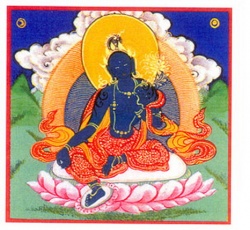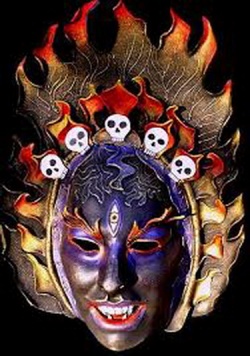Black Tara
<poem> Black Tārā, associated with power;
Black Tara represents the enlightened activity of wrath, which involves using forceful methods for accomplishing activities for enlightened purposes that cannot be accomplished through other means."
Black Tara is a wrathful manifestation, identical in form and, no doubt, source, to Hindu Kali and is associated with power. Like Kali, She has a headdress of grinning skulls, like Kali, she is black, like Kali She has three eyes. Like many Tibetan deities in the wrathful aspect, She has the fangs of a tiger, symbolizing ferocity, a ferocious appetite to devour the demons of the mind. Her aura or halo is fiery, energetic, full of smoke symbolizing the transformation of fire.” ”The Black Tara has been compared to the perfect guardian of the void, the Divine Mother of compassion and a firm Goddess to ward off any forms of evil.” “There are several ‘Black’ Taras invoked by Buddhists:
The Terrifier (Jigjema, Skt. Bhairava): brownish-black with tinges of red. She is “Victorious Over the Three Worlds.” She subdues evil spirits and cures any illness caused by them.
The Invincible (Shen.gyi.mi.tub.ma) “Crushes the Forces of Others” is black. She causes your acts, intentions and aspirations to be invincible.
The Conqueror of Opponents (Shen.le Nam.par Gyel.ma) is red/black. “Pulverizer of the Maras,” She nullifies the influences of any who oppose one’s spiritual aspirations.”
Kali is the great Dark Mother of India. In Hindu mythology, when the world was being devoured by demons, there came a time when even the great Gods couldn't battle them. And so Kali the terrible manifested, the "last ditch savioress". Kali is the One who brings the forest fire, levelling the ground so new growth can occur, the surgeon who cuts cleanly away morbid tissue so flesh can heal.
The icon of Kali, dancing on the prostrate body of Shiva, is a strange and horrific image to the western sensibility. Christian theology is dualistic, but Hinduism and Buddhism are not. In Bali, the curbs of Ubud are all painted like a checker board, black and white, as are the altar clothes. This is to remind those who walk down the street continuously of Sekala and Neskala, the continuing balance of Dark and Light, the yin/yang of life. Kali appears in Bali as the dreadful, fanged, bloodthirsty Rangda. Battles with her are always fought by the benign dragon, the Barong, in dreadful graveyards. But no one ultimately wins. Because, perhaps, the battle must continually be fought. And Rangda, work done, often then returns to the heaven realms, to become beautiful, peaceful Uma, wife of their version of Lord Shiva. Kali, whose name means "Time" (Kala) lives beyond form, beyond the pairs of opposites, the truth beyond the skeins of karma.
Ekajati is also the name of a wrathful form of Green Tara known as Black Tara. She is depicted in seated posture holding a curved knife and skullcup. This form is often shown in a triumvirate with Avalokiteshvara and Green Tara. <poem>

